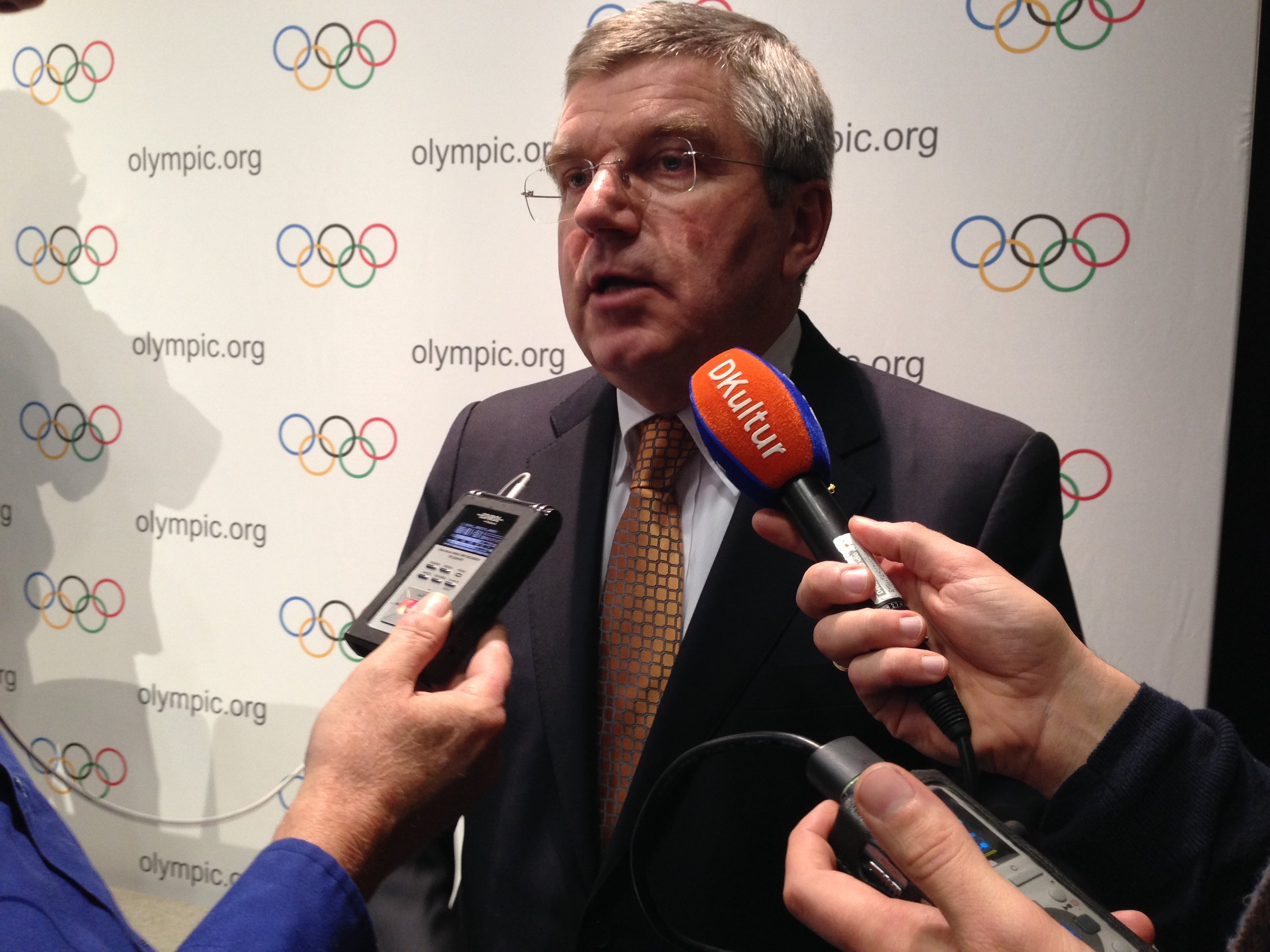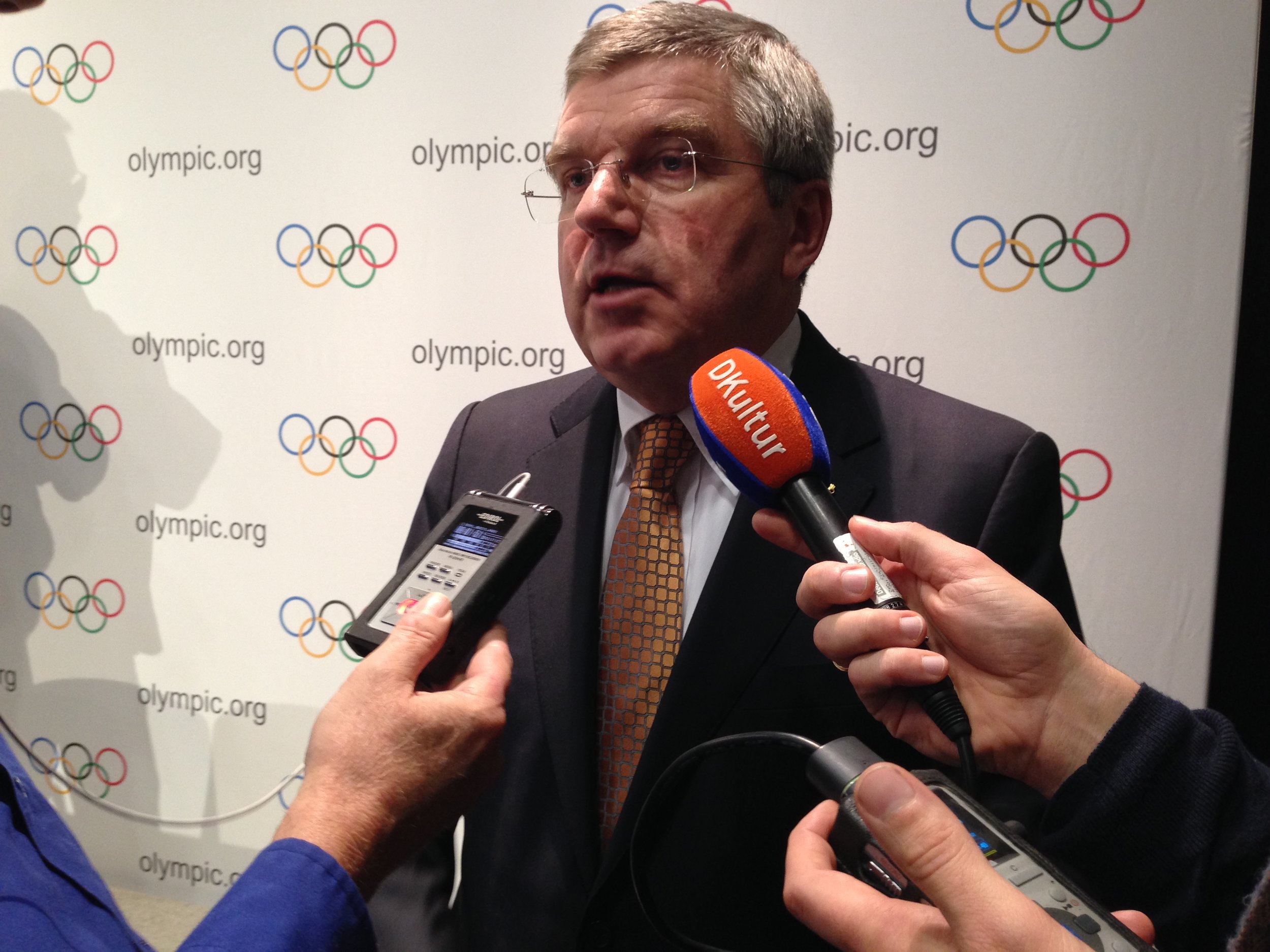LAUSANNE, Switzerland --Russian organizers will set up protest zones in Sochi, the new International Olympic Committee president, Thomas Bach said here Tuesday. Whether they will work, or anyone will have the courage to want to step into them amid what is expected to be a ferocious security presence, remain very much an open question. The IOC president took the high road: "It's a measure we welcome," Bach said of the protest area, "so that everybody can express his or her free opinion."
With an emphasis on such immediate challenges and even a nod to ceremony, the first executive board meeting of Bach's IOC presidency commenced here Tuesday and then, no surprise, broke up after a few short hours, the focus on Sochi, on the Rio 2016 project and even on a long-term plan that Bach has taken to calling "Olympic Agenda 2020."
The former president, Jacques Rogge, handed over the keys to the presidential office at the IOC's lakefront headquarters, the Chateau de Vidy. Later Tuesday, the Olympic Museum, just down the road along the lake, was officially re-inaugurated.
But, first and foremost, Sochi.
The 2014 Winter Games are now just 59 days away. A host of other pressing near-term issues loom large on the agenda.
Despite the massive security presence due in and around the Sochi venues, activists purportedly now will be free to protest, for instance, the Russian law that purports to ban "propaganda of nontraditional sexual relations” to those under 18.
In August, Russian President Vladimir Putin had signed a decree banning "gatherings, rallies, demonstrations, marches and pickets" for 2 1/2 months in Sochi around the Olympics and Paralympics. It is due to go into effect on Jan. 7. The Games start Feb. 7.
Bach said Sochi 2014 organizers informed the IOC of the decision to set up protest zones during their report to the board on Tuesday.
As a point of comparison: protest zones in Beijing in 2008, miles away from Olympic venues, largely went unused. Bach said he was unsure where the 2014 protest site is to be located.
Without making explicit reference to the gay controversy, Bach noted that IOC rules about what athletes can -- and can not -- do and say under the Olympic charter are going to be sent out shortly to the more than 200 national Olympic committees. Rule 50 bars political statements within Olympic venues. Rule 40, moreover, limits what athletes can do in regard to individual sponsorships. "They," meaning the rules, "are there to protect themselves," meaning the athletes, Bach said.
Bach noted that there is "still a lot to do" in Sochi "with regard to infrastructure, accommodation and other issues." Even so, he said, the IOC remains "very confident" that "everything will be in place and we will have really an excellent stage for the best athletes of the world."
The Rio 2016 Games, widely seen in Olympic circles as an "adventure," have already drawn the new president's sharp attention. He said he plans to travel to Brazil -- before Feb. 7, and Sochi gets going -- to meet with Brazilian president Dilma Rousseff and other officials. And after Sochi, the "top priority" of Gilbert Felli, the outgoing Games' executive director, will be Rio, Bach said, a recognition -- if not admission -- the project needs special attention. Even though Felli is formally retiring as of Aug. 31, he will continue long after to "work closely" with Rio organizers, Bach said.
"We have to realize, and also the organizing committee has realized, there is not a single moment to lose," Bach said. "Every effort has to be made, every single day, to bring the construction of Olympic sites and infrastructure forward."
Beyond all that, there already is in the works the makings of a long-term strategic plan. This is what Bach has taken to calling "Olympic Agenda 2020."
Indeed, the executive board -- after holding the briefest of meetings Tuesday morning with the Assn. of National Olympic Committees and then convening itself for the rest of the day -- is now due to head off for a four-day retreat up Lake Geneva in Montreux, better known as the site of the famous summer jazz festival, for a think session to sketch out Olympic Agenda 2020.
Everything -- for emphasis, everything -- not only should be but appears to be on the table.
As Bach has described it, this "brainstorming meeting" essentially breaks down into four categories:
One, sustainability. This includes everything from bidding for the Games to the 28-sport limit at the Summer Olympics to the management of the Games to "legacy," or what to do with Olympic venues post-Games to avoid so-called "white elephants" like the stadiums in Athens or Beijing.
Also: should the members be allowed again to the visit cities bidding for the Olympics? Should baseball and softball be allowed into the Tokyo 2020 Games? How, broadly speaking, to jazz up the program? Should tug-of-war be allowed in as a sport? Skateboarding? Surfing?
Two, credibility. This revolves around issues such as doping and match-fixing as well as issues of autonomy and governance.
Three, youth and the Youth Games. As Bach said, the notion here is how to " get the couch potatoes off the couch." What if the Youth Games, which came to life under Rogge, were used as a laboratory, just to see what worked and, perhaps, more intriguingly, what didn't? Above all, the IOC's No. 1 challenge is to remain relevant with young people.
Four, the structure of the IOC itself. Here, there are bound to be discussions revisiting some of the reforms that were enacted in 1999 amid the Salt Lake City scandal -- such as, for instance, the rule that now forces IOC members out at age 70 (it used to be 80). Fourteen years after that rule came into effect, there appears to be widespread consensus that 70 is too soon, that considerable talent and networking is being forced out in a world where being 70 is not necessarily old anymore.
This big-picture think is, frankly, long overdue. Every organization ought to go through something like it periodically. For the IOC, the change in the presidency is the natural time.
Bach has cautioned that the Montreux retreat is not designed to and will not produce decisions. There may be a new president but, as ever, the IOC moves at a deliberate pace.
In this instance, that makes sense. There are stakeholders of all sorts to consult. At the outset of his presidency, Bach enjoys considerable goodwill. Even so, he will want time to pursue that buy-in.
The timetable:
December 2013 -- Montreux retreat.
February 2014 -- Sochi session.
Fourth quarter 2014 -- probable extraordinary session, somewhere, to review and presumably enact Olympic Agenda 2020. "I hope we will need one," Bach said.
The other advantage of this Montreux retreat, of course, is that while it can be assumed, politically, that the 14 others on the board are with the new president, the four days together will give him the chance to see who is all the more with him.
These next few days and weeks also will give everyone the chance to see -- with the elections in Sochi coming right up, by a quirk of the IOC calendar -- who is vying for authority in Bach's early years.
If, for instance, Zaiqing Yu of China isn't a candidate for the IOC vice-presidency, that would by most accounts be a surprise.
Similarly, if Turkey's Ugur Erdener doesn't run for the board, that would be unusual. Same goes for Canada's Dick Pound, who lost out by a mere one vote in Buenos Aires in September.
In just under two months, it's Sochi. Now, though, it's off to Montreux. No press allowed. No outsiders.
"I'm really looking forward to a brainstorming meeting in Montreux," Bach said. "Don't expect any kind of decisions from this meeting. It will be brainstorming."







